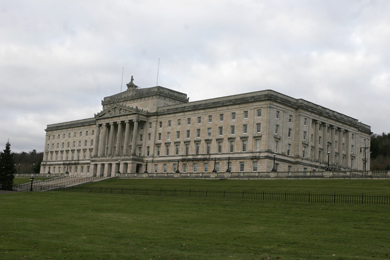John McCallister MLA, Independent Unionist for South Down, has secured the First Reading of his Assembly and Executive Reform (Assembly Opposition) Bill in the Northern Ireland Assembly today (Tuesday 22 September).
The Bill, which proposes major reforms to our institutions, seeks to make the Executive less divided and more efficient while at the same time introducing a formal Opposition to the Assembly, with the ultimate objective of making politics in Northern Ireland deliver better outcomes for all the people who live here.
[caption id="attachment_58956" align="alignleft" width="390"] Independent South Down Unionist John McCallister has made the first step in introducing a bill at the Assembly to reform its procedures and set up an official opposition. [/caption]
Independent South Down Unionist John McCallister has made the first step in introducing a bill at the Assembly to reform its procedures and set up an official opposition. [/caption]
Mr McCallister said: “I am delighted that the Bill has reached the floor of the Assembly. The public’s confidence in these institutions and politicians is at an all-time low – people have simply lost faith in the tit-for-tat politics which repeatedly fails to deliver.
“My ultimate objective is to normalise politics here, to ensure that Government in Northern Ireland is focused on issues which matter to people, be that Health, education, roads or the economy. Reforming our institutions, through this Bill, is a crucial first step to achieving that goal.
“My Bill seeks to reform the Executive and the Northern Ireland Assembly in a way which will improve the effectiveness and efficiency of Executive decision making and enhance the scrutiny those decisions are subject to, by introducing a formal Opposition.
“The problem we currently face is that the parties of the Executive have no sense of collective responsibility, with Ministers regularly disagreeing with each other and on occasions fighting each other in court – this is no way to run a country. By introducing Collective Cabinet Responsibility, Executive parties will be responsible and accountable to the people as one entity. This would force Ministers to either get on with the job of Government – making decisions on jobs, welfare, hospitals, schools and universities – or if they cannot agree with Government policy, resigning from office.
“A formal Opposition will better hold the Executive to account and present the public with an alternative Government come election time – moving our politics to a more normalised footing of voting Governments in and out of power based on performance.
“Seventeen years after the Belfast Agreement it is now recognised that our institutions are not fit for purpose, yet despite a lot of hot air, nothing has been done. My Bill will force all parties to show the colour of their money and either vote for reform – restoring some public trust – or they can choose to stand still and continue with the dysfunctional system which has delivered so little to so many.”
The Assembly and Executive Reform (Assembly Opposition) Bill
The Bill aims to normalise politics in Northern Ireland, making it more policy focused by enhancing the efficiency and effectiveness of Government and the scrutiny it is subjected to by the Northern Ireland Assembly – ultimately improving outcomes for the public. The core objectives of the Bill are to reform the institutions of the Northern Ireland Executive and the Assembly, by introducing Collective Cabinet Responsibility and a formal Opposition.
Reforming the Executive
If enacted:
* The Bill will ensure that a Programme for Government and broad budget headlines are agreed before Ministers take up Office, with a view to creating a more policy focused and cohesive Executive. (The budget will be passed by a simple majority of the Assembly).
* The Bill will introduce Collective Cabinet Responsibility into the Northern Ireland Executive’s Ministerial Code, with a view to ensuring greater cohesion in Government, joint decision making and a greater focus on collective Executive policy and collective responsibility.
* The Bill will see the Northern Ireland Executive become a single legal entity to ensure greater cohesion, collective responsibility and to reduce the likelihood of Ministers taking each other to court.
* The Bill will see OFMDFM renamed the Office of the First Ministers with a view to reducing the tribal nature of elections based on either retaining the office of First Minister or gaining the Office of First Minister.
* The Bill will introduce a threshold that stipulates political parties must gain 16.6% (18/108MLAs) of Assembly seats before they are automatically entitled to enter into the Executive and gain a ministerial position under the d’hondt system. This does not preclude a party which does not make the threshold negotiating its way into Government, based on agreement with Programme for Government and Budget headlines.
Reforming the Northern Ireland Assembly – an Opposition
If enacted:
[caption id="attachment_40364" align="alignright" width="390"] John McCAllister MLA has succeeded in introducing a bill to try and reform the Assembly and install an opposition system.[/caption]
John McCAllister MLA has succeeded in introducing a bill to try and reform the Assembly and install an opposition system.[/caption]
* The Bill will create a formal Opposition which confers enhanced speaking rights and a minimum 15 days per years set aside for Opposition business, with a view to enhancing the accountability of the Executive and improving the potential for an alternative Government being presented to the public.
* The Bill will create the roles of Leader and deputy Leader of the Opposition.
* The Bill will mean the Leader and deputy leader of the Opposition get first and second topical questions to the First Ministers allowing for a more visible expression of Opposition and alternative Government, in the ilk of Prime Ministers Question Time. Chairs of Assembly Committees will also be given first topical questions to their respective Ministers with a similar objective.
* The Bill will ensure the Chair of the Public Accounts Committee comes from an Opposition party, with a view to enhancing the financial scrutiny of the Executive.
* The Bill will create a Budget Committee, (in line with the Scottish Parliament) with a view to enhancing the Assembly’s scrutiny of the Budget and the financial implications of Executive policies and legislation.
* The Bill will allow for the creation of Technical Groups made up of 5% or more of MLAs (six Members) from different parties or independents that are not in Government. This will confer the additional rights of access to the Business Committee and the nomination of the Leader or deputy Leadership of the Opposition, in the absence of a qualifying political party, with a view to enhancing the roles of small parties and independents and their ability to hold the Executive to account.
Community Designation and Petitions of Concern
* The Bill will remove the community designation with a view to eliminating one of the most tribal/sectarian aspects of our institutions – refocusing political attention to policy and ideas.
* The Bill will replace petitions of concern with a minority protection mechanism based on a weighted majority vote triggered by the signatures of 30 MLA’s from three different groupings (party or independents) – with a view to reducing the tribal nature of our politics whilst protecting minority rights.
* The Bill will see d’Hondt run through from Executive to Committee Chairs and Committee makeup as a single process; therefore incentivising parties to opt out of the Executive with an enhanced role in the Assembly.
The Speaker of the Assembly
* The Bill ensure that the Speaker is elected by Assembly Members by a weighted majority in a secret ballot; the Speaker will subsequently be replaced in their constituency by co-option with a view to placing the Speaker above party and constituency politics by ensuring he or she exclusively represents in the interests of the Legislative arm of Government – the Northern Ireland Assembly.
Approach to the Bill
The proposals in the Bill are split into two parts – the first part dealing with issues which the Northern Ireland Assembly is legislatively competent to deal with and the second part dealing with changes that will need to be made in Westminster, by amending the Northern Ireland Act.
The Bill will effectively present the will of the Northern Ireland Assembly, through a piece of legislation, to the Secretary of State for Northern Ireland with regards to reform. The Northern Ireland Assembly will then report regularly on the progress the Secretary of State has made against the proposals she is responsible for within the Bill.
]]>























